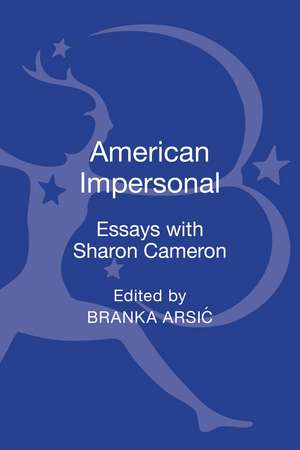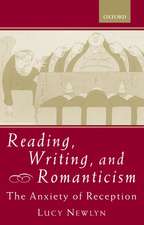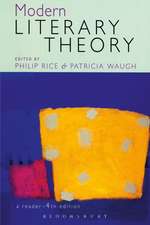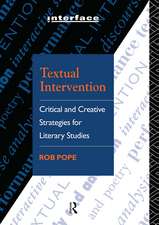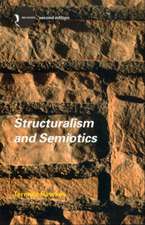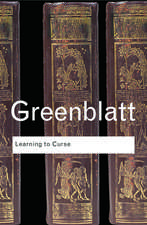American Impersonal: Essays with Sharon Cameron
Editat de Professor Branka Arsicen Limba Engleză Hardback – 23 apr 2014
Preț: 833.47 lei
Preț vechi: 1067.42 lei
-22% Nou
Puncte Express: 1250
Preț estimativ în valută:
159.56€ • 164.10$ • 132.37£
159.56€ • 164.10$ • 132.37£
Carte tipărită la comandă
Livrare economică 18 februarie-04 martie
Preluare comenzi: 021 569.72.76
Specificații
ISBN-13: 9781623567590
ISBN-10: 1623567599
Pagini: 376
Dimensiuni: 140 x 216 x 30 mm
Greutate: 0.59 kg
Ediția:New.
Editura: Bloomsbury Publishing
Colecția Bloomsbury Academic
Locul publicării:New York, United States
ISBN-10: 1623567599
Pagini: 376
Dimensiuni: 140 x 216 x 30 mm
Greutate: 0.59 kg
Ediția:New.
Editura: Bloomsbury Publishing
Colecția Bloomsbury Academic
Locul publicării:New York, United States
Caracteristici
Ordered historically, the volume will also adapt well to survey classes on American literature
Notă biografică
Branka Arsic is a Professor of English and Comparative Literature at Columbia University, USA. She is the author of On Leaving, A Reading in Emerson (2010) and The Passive Constitutions, 71/2 Times Bartleby (2007). She has co-edited (with Cary Wolfe) a collection of essays on Emerson, entitled The Other Emerson (2001).
Cuprins
PrefaceIntroductionChapter 1: James D. Lilley, University at Albany, SUNY, USA - Being Singularly Impersonal: Jonathan Edwards and the Aesthetics of ConsentChapter 2: Colin Dayan, Vanderbilt University, USA - Melville's Creatures, or Seeing OtherwiseChapter 3: Paul Grimstad, Yale University, USA - On Ecstasy: Sharon Cameron's Reading of EmersonChapter 4: Johannes Voelz, Goethe-Universitat Frankfurt, Germany - The Recognition of Emerson's Impersonal: Reading Alternatives in Sharon CameronChapter 5: Vesna Kuiken, Columbia University, USA - On the Matter of Thinking: Margaret Fuller's Beautiful WorkChapter 6: George Kateb, Princeton University, USA - Reading NatureChapter 7: Branka Arsic, Columbia University, USA - What Music Shall We Have? Thoreau on the Aesthetics and Politics of ListeningChapter 8: Kerry Larson, University of Michigan, USA - Hawthorne's Fictional Commitments: The Early TalesChapter 9: Theo Davis, Northeastern University, USA - Hawthorne's Rage: On Form and the DharmaChapter 10: Shira Wolosky, Hebrew University of Jerusalem, Israel - Formal, New, and Relational Aesthetics: Dickinson's MultitextsChapter 11: Michael Moon, Emory University, USA - Beyond Sense: Portraits and Objects in Henry James's Late WritingsChapter 12: Shari Goldberg, University of Texas at Dallas, USA - Believing in Maud-Evelyn: Henry James and the Obligation to GhostsChapter 13: Mark Noble, Georgia State University, USA - The Ends of Imagination: Stevens' ImpersonalNote on ContributorsIndex
Recenzii
A book with its eye on the future of American literary studies rather than its past. It proposes nothing less than a fundamental revision of the American intellectual tradition, and the readings it offers provide myriad opportunities to reinterpret the place of American literature in its social, political, and historical milieu.
Coiling and uncoiling, at once lucid and unrecognizable, these essays turn what is marvelous in Sharon Cameron into a collective marvel.
A remarkable-and remarkably diverse-collection of essays that registers the singular influence of Sharon Cameron's unique body of work on how we read, and write about, American literature. The very spine of that canon-from Edwards to Melville, Emerson and Dickinson to James, Stevens and more-is represented here in readings that call upon us to reimagine the ethics of literature and aesthetic experience in light of Cameron's searching meditations on the "impersonal."
Coiling and uncoiling, at once lucid and unrecognizable, these essays turn what is marvelous in Sharon Cameron into a collective marvel.
A remarkable-and remarkably diverse-collection of essays that registers the singular influence of Sharon Cameron's unique body of work on how we read, and write about, American literature. The very spine of that canon-from Edwards to Melville, Emerson and Dickinson to James, Stevens and more-is represented here in readings that call upon us to reimagine the ethics of literature and aesthetic experience in light of Cameron's searching meditations on the "impersonal."
